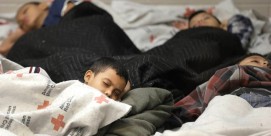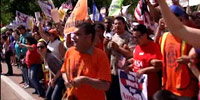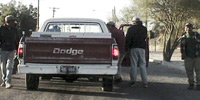DAVID TERESHCHUK: The unforgiving desert along Arizona’s border with Mexico. It’s now getting known more and more as the desert of death. Greatly tightened border enforcement is driving undocumented immigrants to attempt their crossings in the bleakest of terrain. While many church groups and other volunteers leave out water and food for the migrants, a steady number of them will inevitably die.
ROBIN REINEKE: The Sonoran Desert is a harsh place. Without the right preparation it can be extremely deadly with triple digit temperatures often.
TERESHCHUK: Robin Reineke is an anthropologist with a special interest in Arizona’s border crossers.
REINEKE: But in the winter we get a fair amount of cases of people who have died from the cold.
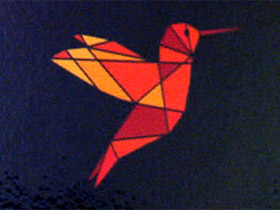 TERESHCHUK: Well over two thousand corpses have been recovered here since the year 2000, and more migrants are thought to have died and never been found. To help their families, Reineke has set up the Colibri Center for Human Rights. Colibri is Spanish for humming bird, believed in Central American cultures to be a messenger between the dead and the living. The center compiles missing person reports and works at finding out just what may have happened to the border crossers who disappear, including of course the many who may have met their deaths.
TERESHCHUK: Well over two thousand corpses have been recovered here since the year 2000, and more migrants are thought to have died and never been found. To help their families, Reineke has set up the Colibri Center for Human Rights. Colibri is Spanish for humming bird, believed in Central American cultures to be a messenger between the dead and the living. The center compiles missing person reports and works at finding out just what may have happened to the border crossers who disappear, including of course the many who may have met their deaths.
REINEKE: The most important and sacred baseline for our work is providing the service to the families of the missing. Care of the dead is such a key part of the Catholic faith. Remembering, honoring the dead is extremely important to these communities. There are so many rituals and traditions after someone dies that you can’t go through if you don’t have a body, or you don’t truly know if the person is dead or alive.
TERESHCHUK: Doubt whether Francisco Matias Flores is dead or alive weighs heavily on his sixteen-year-old daughter, Josette Matias. Her father has been missing for three years. Along with her mother, Amanda, Josette has been turning to her faith.
JOSETTE MATIAS: I hope every day, I pray every day.
TERESHCHUK (to Josette): What’s it been like?
JOSETTE: Hard. Not knowing what had happened to him, to think that he might not come home ever.
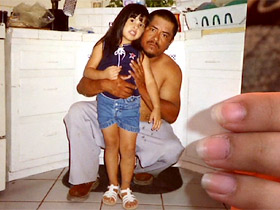 TERESHCHUK: Amanda is now divorced from Francisco, an undocumented Mexican immigrant, but they cooperated well in bringing up their daughter. He’d lived and worked for 20 years in the US, but that suddenly ended when police stopped him for suspected drunk driving, and he ended up being deported. He phoned his ex-wife from Mexico where he’d been sent, to say he was coming back.
TERESHCHUK: Amanda is now divorced from Francisco, an undocumented Mexican immigrant, but they cooperated well in bringing up their daughter. He’d lived and worked for 20 years in the US, but that suddenly ended when police stopped him for suspected drunk driving, and he ended up being deported. He phoned his ex-wife from Mexico where he’d been sent, to say he was coming back.
AMANDA MATIAS: He wanted to come back because Josette had just turned 13, and he wanted to be here for her birthday party.
TERESHCHUK: But soon after Francisco set off through the desert, contact ended with his family. A fellow-migrant who crossed the border with him told Amanda later that Francisco had begun to tire, and he had stopped to rest. His companion went on, only to get caught.
AMANDA MATIAS: When he was caught by border patrol, he says that he told them that his friend had stayed behind, and that was it. They didn’t ask him where, how far behind did he stay, so they could go and do a search and rescue. Once they believe that the body’s a cadaver, they don’t go back and check.
TERESHCHUK: Trying to check for themselves what may have happened hasn’t been easy for the Matias family. Though Amanda may have had some clues to work on, government officials have not helped with her search.
AMANDA MATIAS: It’s nerve-racking when you finally get some kind of hope to say, okay, I’m one step closer to finding him. And they sit here and push me 20 steps back by saying that they couldn’t help me. Because he wasn’t a legal citizen here in the United States.
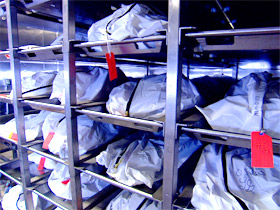 TERESHCHUK: Tracing non-citizens who’ve gone missing is made harder by the sheer scale of the problem. The Sonoran Desert is situated in Arizona’s Pima County, not a densely populated jurisdiction. But the county medical examiner’s office has to cope with a disproportionate number of bodies in its morgue.
TERESHCHUK: Tracing non-citizens who’ve gone missing is made harder by the sheer scale of the problem. The Sonoran Desert is situated in Arizona’s Pima County, not a densely populated jurisdiction. But the county medical examiner’s office has to cope with a disproportionate number of bodies in its morgue.
(in morgue): Here with the refrigeration unit keeping temperatures down to 40 degrees Fahrenheit or less, there’s evidence of Pima County’s distinctiveness. Outside of the big-city jurisdictions of New York and Los Angeles, the nation’s highest numbers of unidentified human remains are to be found in Pima County on the borderline between Arizona and Mexico.
TERESHCHUK: Dr. Bruce Anderson leads the county’s forensic anthropology team.
DR. BRUCE ANDERSON (Pima County Forensic Anthropology): We’ve only identified about 60 percent of the migrants, so there remains about 800 unidentified people that we suspect are migrants.
TERESHCHUK: That’s a huge increase compared with unidentified deaths 20 years ago.
ANDERSON: We were not prepared for this ten-fold and then twenty-fold increase of migrant deaths. We don’t have a different protocol for dealing with migrants than we do with presumed American citizens. We do what we think is a thorough, full postmortem examination.
TRACI VAN DEEST: The skeletal remains that we have here are likely of a young adult male, likely between the ages of 20 and 30. You can see there’s multiple layers of clothing, layers of pants, multiple shirts. That’s fairly common. You can wear it, you don’t have to put it in your backpack. You can carry other things.
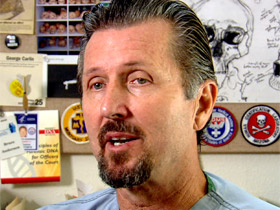 ANDERSON: If we suspect it’s a migrant, it makes sense that we go through the Colibri Center and look at the missing migrant descriptions.
ANDERSON: If we suspect it’s a migrant, it makes sense that we go through the Colibri Center and look at the missing migrant descriptions.
TERESHCHUK: What Colibri brings to the table is largely better communication with migrants’ families than many government agencies can achieve. Relatives are often unwilling to make a report to law enforcement. Reineke and her team piece together the personal information—sometimes overlooked details—that can lead to a corpse being identified, though it’s not always easy.
REINEKE: It can be things as individualizing as a very specific tattoo, an Aztec sun on the shoulder, for instance, or the tattoo of Jesus Christ on the arm. But you have to have the tattoo visible and present, which in the desert circumstances, where many of these people are dying, is not possible a lot of times. The decomposition process is incredibly harsh on remains. In a lot of cases the tattoos are no longer visible.
TERESHCHUK: In the case of Francisco Romero, another Mexican who was deported but tried to cross back, only to go missing in the desert, tattoo details were useful. They were described to Reineke by his niece and other relatives.
REINEKE: They said that there was a Jesus image on the left arm. After several cases where I was looking at a possible match, this one really stood out, and in the end they recognized the tattoo, and he was positively identified and returned to the family.
TERESHCHUK: Once a burial ceremony could be held for Francisco Romero, his relatives could feel some relief and gratitude, as his niece expressed it:
“We found him, not as I wanted it, but at the same time I felt happy, because so few families find the loved ones they have lost.”
TERESHCHUK: The Colibri Center has now taken up the case of that other deportee who tried returning to the US, Francisco Matias Flores. His family is putting great faith in Reineke and her staff.
AMANDA MATIAS: What Colibri and Robin Reineke and her team do, I think, is amazing. She is an angel. And her whole team is.
TERESHCHUK: Reineke has now taken a DNA sample from Josette Matias and is looking painstakingly for a match with her father among the many human remains she has to work through. But the family knows it may still take a long time until they find—if they ever do—a resolution to their agonizing uncertainties.
AMANDA MATIAS: We might not know the whole truth. If we don’t ever find him we will never know exactly what happened to him, how he died.
JOSETTE MATIAS: My best hope: that he comes home and that nothing happened to him, that he’ll be fine. Or maybe he’s up in heaven watching over me.
AMANDA MATIAS: He probably won’t make it home anymore. I would just like to give my daughter that closure.
TERESHCHUK: Whenever Reineke’s team has successfully identified some human remains as a particular missing migrant, she experiences some very mixed feelings.
REINEKE: I’m working with families who by and large are tremendously relieved, when they get this news, which to me is very heartbreaking, because it speaks to how much anguish they would have gone through before the news.
TERESHCHUK: For Religion & Ethics NewsWeekly, this is David Tereshchuk in Pima County, Arizona.

 TERESHCHUK: Well over two thousand corpses have been recovered here since the year 2000, and more migrants are thought to have died and never been found. To help their families, Reineke has set up the Colibri Center for Human Rights. Colibri is Spanish for humming bird, believed in Central American cultures to be a messenger between the dead and the living. The center compiles missing person reports and works at finding out just what may have happened to the border crossers who disappear, including of course the many who may have met their deaths.
TERESHCHUK: Well over two thousand corpses have been recovered here since the year 2000, and more migrants are thought to have died and never been found. To help their families, Reineke has set up the Colibri Center for Human Rights. Colibri is Spanish for humming bird, believed in Central American cultures to be a messenger between the dead and the living. The center compiles missing person reports and works at finding out just what may have happened to the border crossers who disappear, including of course the many who may have met their deaths. TERESHCHUK: Amanda is now divorced from Francisco, an undocumented Mexican immigrant, but they cooperated well in bringing up their daughter. He’d lived and worked for 20 years in the US, but that suddenly ended when police stopped him for suspected drunk driving, and he ended up being deported. He phoned his ex-wife from Mexico where he’d been sent, to say he was coming back.
TERESHCHUK: Amanda is now divorced from Francisco, an undocumented Mexican immigrant, but they cooperated well in bringing up their daughter. He’d lived and worked for 20 years in the US, but that suddenly ended when police stopped him for suspected drunk driving, and he ended up being deported. He phoned his ex-wife from Mexico where he’d been sent, to say he was coming back. TERESHCHUK: Tracing non-citizens who’ve gone missing is made harder by the sheer scale of the problem. The Sonoran Desert is situated in Arizona’s Pima County, not a densely populated jurisdiction. But the county medical examiner’s office has to cope with a disproportionate number of bodies in its morgue.
TERESHCHUK: Tracing non-citizens who’ve gone missing is made harder by the sheer scale of the problem. The Sonoran Desert is situated in Arizona’s Pima County, not a densely populated jurisdiction. But the county medical examiner’s office has to cope with a disproportionate number of bodies in its morgue. ANDERSON: If we suspect it’s a migrant, it makes sense that we go through the Colibri Center and look at the missing migrant descriptions.
ANDERSON: If we suspect it’s a migrant, it makes sense that we go through the Colibri Center and look at the missing migrant descriptions.